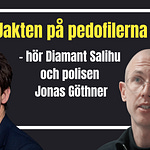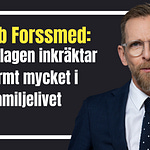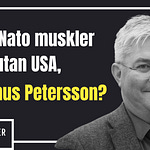Frank Furedi är en av de mer inspirerande tänkarna jag stött på. Hans formella titel är professor emeritus i sociologi vid universitetet i Kent i Storbritannien där han också bor. Men han har varit en otroligt produktiv offentlig intellektuell under lång tid. Jag har säkert räknat fel och missat någon bok men vad jag se har han skrivit 25 böcker sedan 1986.
Hans senaste bok heter Democracy under siege (Zero books 2020) som kom ut i oktober förra året. I den visar han hur motståndet mot demokrati har en lång historia. Förr brukade filosofer och andra vara öppet föraktfulla mot folket – eller “pöbeln” – och vara helt ärliga med att demokrati var något de betraktade som farligt.
I dag har detta blivit ofint, och därför kommer föraktet till uttryck på andra sätt, genom omskrivningar. Man attackerar inte demokratin rakt på, utan varnar i stället för populism. Etablissemanget har drabbats av vad Furedi kallar för demokratipanik, vilket får dem att försöka begränsa medborgarnas inflytande på olika sätt. Man avpolitiserar frågor, för över deras avgörande till experter, låter teknokrater sköta mer och mer. Och den som protesterar kallas farlig, extrem eller populist. Det som pågår är en dragkamp mellan torget och tornet, mellan folket och etablissemanget, mellan en förskansad elit som vill behålla makten och folket som vill att demokrati ska vara mer än en procedur för att välja samma gamla klägg, för att låna Håkan Juholts ord, om och om igen.
Nedan kan du läsa samtalet i en något nedkortad version.
Welcome Frank Furedi to Rak höger!
– It’s a pleasure to talk to you.
I came across your work for the first time when I read Therapy Culture, a book that came out in 2003. I read it a couple of years later and it blew my mind. There was especially one example in your book where you go through how many times we mention terms like “stress” and “anxiety” and how we are continuously changing our way to describe hardship in a therapeutic language and I realized I'd been doing that for my whole life. I had to rethink how I describe myself. I think you brought up a mining crisis in Wales. When it happened, people didn’t seem that traumatized. But then the media went back with their therapeutic language, and they sort of reinvented the trauma of the miners because a lot of children died. Of course, it was an awful catastrophe. Could you summarize the thesis of Therapy Culture? I think it’s an interesting thesis and I think it was prescient.
– I think what I was trying to deal with was the fact that what it means to be a human being has been gradually reshaped by the discipline of psychology. Psychology is okay in a clinical setting but when it becomes something that is used to define who we are, how we think, then the way we experience the world alters fundamentally. So, for example, I always remember when my son came home from school at the age of seven, and he was using words like “I'm stressed, I'm depressed”. He sounded like a little Freud and I'm sure he didn't know what those words meant. But the very fact that the teachers were talking about being traumatized and being stressed in such a casual kind of way, meant that young children were already encouraged to become extremely inward-looking. And instead of engaging with the external world and having a sense of their strength. They were always being reminded of their weaknesses, their powerlessness. And that's why the title of the book is Therapy culture -Cultivating Vulnerability. Because what we're doing is we're almost encouraging people to become conscious of how weak and powerless we are and therefore how important it is that you and I are insulated from the pains of everyday life from distress, from the normal prompt of rejection, which is inevitable, from the pressures that are kind of placed upon us. The look is an exploration of the meaning of this cultural turn, everyday human behavior, and the western setting.
You saw a trend that has just accelerated, you were ahead of the curve there. It was 15 years later that Jonathan Haidt and Greg Lukianoff came out with The Coddling of the American Mind where they see that the vulnerability of American students is exploding on college campuses. The coddling is that you are encouraged to see yourself as vulnerable and behave as if you are vulnerable. Greg Lukianoff had struggled with clinical depression, and what had helped him was cognitive behavioral therapy where you try to become less vulnerable. He saw that our culture is doing the exact opposite, but you saw these trends 15 years earlier. I think it was when I read your book that I realized, and maybe I'm a late bloomer or not so smart, but it was the first time that I realized that the word “stress” is not a neutral way to describe something. It's actually a cultural word to describe a phenomenon. It's not a natural state. Do you think that the trend that you saw then has accelerated as I described it? How do you view it now?
– The way that I see it is that language is very useful because almost all the words that we use in the English language, I don't know about Swedish or other languages, are fundamentally altered. We are using words now routinely that would have been unthinkable in the past. For example, the word “vulnerable” was never used as a psychological word until the 1980s. Until that point, it was used as a description of physical entities, when you talked about the vulnerability of bridges or buildings. The first time it was used was concerning babies in 1978-79 by some psychiatrist and then it just exploded. When I wrote my book, at the turn of the 21st century, it was already in the mainstream but today, in 2021, the psychological turn has acquired such a powerful momentum, that it has become the defining medium through which western society interprets its cultural experience, its political experience. The boundary between what is our inner life and what is our outer life has gone completely, the two are entirely the same. In that sense, we become so accustomed to it that we don't even notice that there's anything unusual about defining normal problems of life such as distress or pain, which is a normal part of our life, through a psychological diagnosis.
There has been a trend to take the psychological terms, the therapeutic language, and project them onto history. For example, you can say “How many of the Roman legionaries had PTSD?” You can go back and give a psychiatric diagnosis to historical figures to explain their ideas or their behaviors. We are replacing an older language and older frame of analysis with this therapeutic frame of analysis.
– Yeah, it's got an imperialistic ambition, it wants to spread everywhere. And we have a situation where the past is continually being rewritten as if the people in the 14th or 12th century had already become familiar with Freud, or with Jung. The best example for me is if you look at the decolonization movement in Britain, you have a situation where a lot of students at Oxford University complain about the fact that when they a statute, they get traumatized by it. I think that's something that tells us that in a sense the use of psychology, the boundary between the present and the past has been continually eroded. It's almost as if we read history backward through the language of psychology.
I think this is still one of the best books on this subject, even though it predated social media and college identity politics. I really recommend listeners to read Therapy Culture, because it's really, really good.
But you have written a new book which has the title Democracy Under Siege. In this book, you explain how the idea of democracy has been challenged historically, but since the19th century, you don't challenge it formally anymore. You don't say “I'm against democracy”. You say that you are against populism or that you are for liberal constraints on democracy. Do you agree with that summary, and could you elaborate on which way democracy is under siege today?
– Well, I wrote the book because I noticed that if you go into a bookshop, before covid, in New York or London, and you look at the nonfiction section, there are loads and loads of books with the title “Against Democracy”, with titles that suggest that there's something wrong with democracy. They’re quite explicit in raising suspicions about it. And I noticed that even people who pay lip service to democracy, continually put limitations on it. This became very evident to me when I was doing a speaking tour in Europe on the subject of populism, and I kind of shocked the audience because they couldn't imagine that a sociology professor would have something positive to say about populism. This is in Amsterdam and a guy puts up his hand and says “Are you saying that democracy is good in and of itself? I said “Yes”. I said “Even if the people that I want to get elected, get defeated, I still would rather have a democratic process and society, even if I lose. Rather than somehow manipulate things in such a way that the guy that I like becomes prime minister”. I said “To me, democracy is something that's about living a particular kind of life. Democracy is something you live rather than something that's given to you on a piece of paper” and the audience just erupted. They couldn't believe how anybody could say that democracy is more than just a method for getting people elected, that is a valuable thing in and of itself. I looked around and I realized that everywhere I went, people, were using the expression “I believe in democracy, but…” It's what came after the “but”, that was important. What came after the “but” was “I don't believe in democracy. I don't think that we can trust the people. I think that experts should have more of a say, in how we deal with this and that problem” or they would say that “there are educated people who are more sensitive and understand what needs to be done than these millions of ignorant individuals”. When you scratch the surface, you find that the arguments they were using against democracy were rehashed, those arguments were already used in ancient Athens by the oligarchy against the demo. So, I find this important, particularly at the time of covid when there was such contempt for the democratic process and all of a sudden everybody was saying that “now is not the time for political debate, no is the time for the experts to tell us what needs to be done”.
I think the example of covid is very interesting. You live in Great Britain and I in Sweden, so we have had different experiences because the countries have dealt differently with covid. But one thing that I noticed in Sweden is the experts at Folkhälsomyndigheten, they were the ones in charge. We had some public debate, but in the beginning, you were almost labeled a traitor if you challenged the expert government agency. You had to be subservient, loyal, and quiet, that was your role as a citizen. And those who did not conform to that were very heavily criticized. It didn't just pertain to citizens in the public sphere but also scientists. There were differing views among scientists, and they were not crackpots. These were some of our most-cited scientists in the field, they were experts in epidemiology and associated sciences. But there was no way for them to be heard because of the government agency and they were frowned upon and ridiculed. They weren't put in jail or anything but the social stigma for them was very high. A lot of people who were caught on the wrong side of the argument had a new view of how our democracy works. We should obey and we should not question authority. I think this highlights some of the themes in your book as well. Many people and authority figures say that they like democracy but what they say is that they like the legitimacy that comes with being elected, but they don't like when the citizens raise their voices at other times.
– I think that’s true, and it was more or less the same situation in Britain and Sweden. It’s very strange because I do believe in the expertise. For example, if I have a problem with my heart, I'll go to the best surgeon that I can possibly find, and if I want to know something about how the planet work, I go and talk to a scientist. But there's a difference between the exercise of legitimate expertise concerning their particular domain and the experts, having the role of being political authorities, where they assume the political role of telling us how to live our lives. Moreover, tell us that there is only one way of going forward, that whatever they say about how we live our lives is beyond discussion and beyond debate and I think that's where their anti-democratic ethos comes out. I'm happy to listen to what they're saying. But at end of the day, I'm not a child, you're not a child. We are in a position to discuss, argue, debate, find some ways of making up your mind. We listen to different experts because they don't always agree. When you have a pandemic, one thing we learned from the history of disasters is that very often it's through the specific context within which people live where they can exercise their common sense, where the community can work out what is the best way forward? That is usually the most effective way of limiting the damage that a particular pandemic or disaster causes. I think in that sense there was a very real anti-democratic turn. In Britain, for example, they used the word “covid deniers” and a covid denier wasn't somebody that necessarily said that covid doesn’t exist. I mean, I think it exists, I think it’s a big problem and I certainly don't want to get it. But the reason why they used the term covid deniers was that it signals that it meant the same thing as a holocaust denier. It was just as bad as denying that the Holocaust existed. There's a kind of a rhetorical trick as a way of stigmatizing and isolating people who raise doubts about these kinds of questions. And as a result of that, what has happened is that a wrong debate was created, and worse still: a lot of people that were stigmatized, that were pushed out from the public conversation, then went to the other extreme. You had a situation where people who felt that they weren't being listened to, began to listen to a lot of these crazy theories, QAnon ideas, and that covid didn’t exist. It created a situation where rather than us coming together and struggling to come up with solutions, we created these parallel universes where people felt scared to open their mouths and raise their criticism and self-censorship. It's probably a greater threat to democracy than real censorship.
When I read political science in the early 2000s, one definition of populism was that you give simple answers to complex questions, and I then thought that was a great definition, but I don't think that anymore. What you described in the book very well is that it's a charge that's leveled against people who want more influence over politics or who want to re-politicize issues. You show that issues have been depoliticized or technocraticized to take away the possibility from citizens to influence certain issues. When they want to take control or influence those issues and exert their political influence to do that, they are labeled populists. Is that a fair summary of what you say?
– It is. I think what I'm trying to argue is that, at the moment, the political establishment in Europe prefers what I call an insulated form of democracy. They insulate their institutions from public pressure, and they call public pressure populism. And the way they insulate is by outsourcing political decision-making to technocratic bodies like the EU, the IMF, or to certain scientific bodies who get to decide a growing proportion of the decisions that are taken. They're quite political. For example, you and I don't have any influence over financial policy anymore. We don't have any influence over the setting of interest rates. We don't have any influence in the way that certain trade policies are decided that affect farmers and employers and all the rest of us. All those things are taken out of our hands. More recently, that has gone into other domains of life, because by medicalizing our lives, by turning ordinary social problems into medical ones, we become even more deprived of debating and discussing and influencing. For me, what populism represents in the 21st century is a demand for voice, a demand to be heard, a demand to be part of the conversation. That's why they are stigmatized. That's why populism is seen as a form of fluoride fascism, it’s always announced in a language that's very unrestrained, and which is entirely an attempt to pathologize populism because the last thing you want is a situation where millions and millions of people feel confident enough to raise questions and demand to be part of the discussion.
This brings us back to the therapeutic language because you also bring up in your book how you psychologize the people you call populists or the supporters of populism. You give them psychological traits to describe them as sick or dysfunctional in some ways. Then you don't have to deal with them as equals, but rather as people who you must treat in some way. Perhaps it's fitting that Donald Trump received this treatment because he is a very special person, but the psychologists in the United States, they broke their own code of honor that one should not psychologize the president or the presidential candidate, but they made an exception for Donald Trump. They were not treating him as a political figure, but rather as a rambling lunatic. That translated in how you view the voters for such a character and how you view the voters for these right-wing populists, but also a segment of the population that you don't treat as political actors, but rather as some deplorables, if you want to use Hillary Clinton's term.
– Yeah, this became very clear in Britain at the time of Brexit, where people that wanted to leave the European Union were described in very unflattering, psychological terms as people that were authoritarian and insecure. A lot of psychological labels were used that suggest that the people that were supporting Brexit were not only psychologically ill but also morally inferior. You have to remember that one of the important things about psychology is that it serves as a medium through which moral judgments are often conveyed. So many make a diagnosis of somebody as someone who’s suffering, having an authoritarian personality. That's not just simply a psychological label, it’s also a sign of moral inferiority. When you explore how populism itself has been described and very actively discussed by different teams of psychologists, they always use a language that suggests that these people are not as intelligent as people on the other side. That comes up all the time. All these studies suggest that somehow these individuals are emotionally illiterate whilst people who are against populism are more sophisticated emotionally, they claim that they are more able to deal with complex ideas than these simpletons. What psychology does, and the way that it's used, as a political weapon, is it spares people from the burden of having to argue politically. Because what's the point of arguing politically with simple people or those who are psychologically ill who suffer from horrible authoritarian-related diseases, you don't argue with them, you treat them. In many ways that as a Hungarian, as somebody born in Hungary in the Stalinist period, that very much reminds me of the way that they would be treating dissidents. They would send them to centers where psychiatrists would deal with them in very similar ways. Maybe a little bit harsher because you don't get sent to asylums that we did in the Soviet Union, but the impulse of using psychology to destroy you, your political reputation, was very much the same.
There's a liberal, I'm not going to name him, but he's one of the most prominent liberal journalist thinkers here in Sweden. During a talk or a debate, he said that “The reason that populists hate us liberals is because we were better than them in school. And do you know what? We're still better than you are in school”. It's saying that it's a question of IQ. I'm not doubting that he's a smart guy, but I do think that he underestimates his opponents and it's very condescending. You also bring up that rationality and reason are used as a preserve for a certain class of people, and you trace this back through history that you have this philosopher class who can reason, able to tackle complex issues, and who can be rational. The masses, the public, they aren't able, and they are dangerous so you should not give them too much responsibility because that can go awry.
– Yeah, I mean ever since the Greeks when they used to argue that demagogues could easily sway the masses, they were too stupid to think for themselves, to the point at which when mass reading began and they used to argue that we shouldn't give books to ordinary people because they would misinterpret them, all the way to arguing that advertisers on television are so strong and the people are so easily manipulated that these poor fools go out and buy everything that they are told, to now where we argue that social media can encourage people to do the opposite of what is in their interest. There’s always the assumption that there are these forces above us, the media, which can manipulate the people who haven't got the capacity, to think for themselves. There are very few important philosophers in the western tradition that challenge this. One of the first political thinkers that questioned this kind of representation was Niccolo Machiavelli. He wrote about what he called “the wisdom of the masses”, and he made the point that although the prince can be very smart and very intelligent, like your friend, the liberal thinker in Sweden, at the end of the day, the wisdom of the masses far outweighs the wisdom of that individual. Because the collective experience of people, who see what everyday life is like, provides valuable insights about the way that the world works. As it happens, from history, the really smart people are not necessarily the ones that are on top. They are people who try to struggle to better themselves and to make their own made from below and that's why you will find that in most European countries, the ruling establishment gets refreshed time and time again by the smart people from below. It's the experience of being part of the people and forcing yourself to understand that but to make your way out of that, it becomes something else. That to me is the most important vehicle, the medium, for really gaining that wisdom and intelligence. It's not the smart liberal of smart experts but it's a more complex dynamic that we’re talking about.
There’s a book by Martin Gurri called The Revolt of The Public and the Crisis of Authority in the New Millennium. It has a similar theme to your book and one of the things that he says, is that because of social media and the internet, the establishment in a lot of countries, they are losing their power to control the information. If we take covid for example, if it were 30 years ago, perhaps when the experts said that “this is the way to do it”, people would have had a hard time getting other kinds of information. But now you see how other countries are dealing with it and you see that there is a lot of disagreement within the expert community, all over the world, and you can immediately access that. You have the Swedish experts and the government agency. They are more easily challenged by facts from other experts or viewpoints, and you can contrast how Sweden is dealing with it or Great Britain with how Australia, New Zealand, or the United States. The establishment feels much more under threat today. One of the ways that they’re dealing with it is to insulate themselves more. One incident that's famous in Great Britain is when Gordon Brown around some election was talking to regular people and an old lady voiced her concern about immigration, and then he got into his car and he forgot to switch his mic off and he said: “Who put me in front of that bigoted woman”.
I think Gordon Brown expressed something that's expressed in secret. You have to control the contact with the public because you're afraid of the challenges from the public. If you go back 100 years, you had mass movements and the politicians were the figureheads of mass movements to a larger degree. Now they are more afraid of the public, they're afraid of the voters. One thing you notice on Twitter with journalists is that they sort of brag about the hate they receive from readers, or the stupid readers and they take screenshots of the stupidity of ordinary readers. It's something you can see in the establishment. I came out with a book called Genusdoktrinen (or The Gender Doctrine) together with Anna-Karin Wyndham. Because it was not vetted through a peer-review process, they had internal seminars in gender studies about our book, but they didn't invite us because we were outsiders. So you have this outsider-insider dynamic that Martin Gurri brings up in his book, that there is a heightened conflict between the establishment and the public.
– In my new book that comes out next month, I talk about this. I'm trying to understand what it is that binds together the kind of people you're describing. Unlike in previous times, it's not a public ideology. It's not liberalism, it’s not conservatism, it's not socialism. Those things barely exist. In my book, I call it an ideology without a name. It’s a core where they know exactly know what the problems are. They more or less react in the same kind of way. When you have a dinner party in Silicon Valley, the guy from Netflix and the guy from Apple and the politician from Washington, all can be more or less reliant to respond to a political problem in the same kind of way. This sensibility, “We are different from them”, a sense of distinction is best expressed in the English language by the term “awareness”. “We are here to raise your awareness”. When they say that, what they mean is “We want you to think the way we think because we know better than you do what is in your interest and what's in everybody else's interest”. It’s a situation where their public face is always “I'm going to raise your awareness”, but their private face is talking in a very contemptuous way about ordinary people. In their minds, these people are scum and white trash. They're people who are by definition racist or homophobic. They’re not worth talking to or taken seriously. Therefore, their strategy at the moment, to strengthen their position, is to bypass the people and to go into the schools where you have very young children, five, six seven, eight-year-olds and directly tried to socialize them, almost indoctrinate them. This is something that you can already see signs of in Sweden, a long time ago in the interwar period. Then the social democratic government, the Myrdals, people began to introduce this kind of education in the nurseries and primary education. But that was nothing compared to what you're getting now, and I think that's the way that they're trying to create a base of support to overcome the isolation that the experience.
They lowered the age for mandatory schooling in Sweden, to six years old. Perhaps it's no surprise that the liberal party and left-wing parties want to lower it even further. Some are discussing, should we lower it to two years old, three years old for mandatory schooling because you have to start early if you're going to be able to influence their minds. And you have to separate the child from the family so the old way of thinking that the parents who are not educated enough in the ways of thinking, or they belong to an older mindset, should not influence their children too much because then they won't have this new mindset we need them to have.
– This is my issue at the moment because in many respects the big political battle in our societies is over how we socialize children. It's not just about bringing kids up, it’s what kind of world we want to live in. I'm much older than you are but already 10, 15 years ago, when my son was in school, we used to laugh about it because my wife and I would debrief him about what he was learning. We used to say “This is what the Furedis think, this is what they think in school”. So, about every issue we would give a different point of view because that was the way we felt. We could make sure that he remained on our side rather than on the side of the stuff that they were getting from their teachers to almost subvert the educational process because he was getting so much, really horrible stuff that he was being taught. That was 15 years ago, now, it's far worse. Now, you have systematic programs of indoctrination in British schools where for example, just yesterday, the Scottish government introduced a program of making white children feel guilty about being white. They're learning about white fragility, they’re learning about the importance of understanding that they have a privilege that dominates our whole life. And if a five, six-year-old child happens to say “I don't agree”, they will shoot that child down. I've got lots of examples of parents who say, their seven-year-old girl, started crying when she was being made feeling guilty for being white. And the teacher just treats her like a mature adult and starts getting involved in an argument. That's the kind of world that we live in. What begins in the nurseries and schools can be directly connected to the way that different types of establishments are attempting to stabilize their own rule and create a degree of legitimacy for themselves.
This will play out in all societies. What you have in the United States, for example. Christopher Rufo is organizing the resistance towards critical race theory, that if you're white you should be aware of your privilege and your position of power and be made to feel guilty. If you're black, then you should be afraid because, at any time, the cops can come and kill you. That’s an actual example where a biracial child, viewed as black, came home to his parents and he was afraid. He was scared of his grandparents on his mother's side who was white because he thought they were racists. So he was very conflicted, and that's like a seven-year-old. They have introduced laws in some states in the United States and Christopher Rufo helped with the legislation to fight this. Parents all over the United States are organizing to try to get those theories away from their schools but it's an ongoing struggle. It's not evident which side will win. When the printing press came around and that enabled the protestant awakening that you could translate the Bible, and you could produce the Bible in local languages, and you could put the Bible in the hand of ordinary people, and you did not have to have the priest to tell you what was in the Bible. You could read the Bible for yourself and make up your mind. This was fought by the Catholic church. This is a very simplified version of history but now we have something similar where people don’t have to rely on one or two-state channels on TV, one or two or three big newspapers. They don't trust authority blindly anymore and they can make up their minds. And then you have the establishment reacting by labeling what they find as abhorrent or morally dubious. They label that as populist and they fight that and they have to fight that to stay in power. I sound like a conspiracy theorist, but on the ground level, I think this is an ongoing struggle between the populists on the left and on the right against the establishment.
– Yeah, I think there's a lot of truth in what you say. I mean, the unfortunate thing is, is that when you have the protestant awakening and in places like Denmark and Sweden, through the Lutheran Church, they actually encouraged people to learn how to read and they gave people the Bible and they trusted them to read the Bible. Then, you had a powerful movement that was for the good in terms of its impact upon cultural, moral, and political life. At the moment, unfortunately, what we have is a similar war being fought out, but the resources and the powers are on the wrong side. People like me and others are continually forced to react rather than initiate. And that's almost the very opposite to what happened with the protestant awakening where they were the ones that had the momentum. Now, what I call the culture war is being fought out on a terrain, not of our own making and we don't have yet a sufficiently serious mature movement to be able to hold the fort. We have our groups of individuals here and they're reacting. And unfortunately, history shows that when you react it's never as powerful as when you initiate. For me, the key thing then becomes “How can we initiate the movement?” That's why Brexit was so important because with Brexit you had an example of people themselves initiating a movement. A movement that was seen as a joke, that was treated with contempt but had sufficient momentum to be able to withstand all the powerful pressures from everywhere to continue on and win. The Brexit movement left a legacy. Britain is no longer what it was because there are a lot of people around who before would have never imagined that they had a role to play in public life, who now take a different view. What we need now does not have to be Brexit or leaving the European Union, it's got to be a movement where people have got the confidence to be able to take matters into their own hands and to follow their intuition and their instinct. I think that's not to me, seems to be the challenge of our times.
For the first time in our political history in Sweden, the Prime Minister had a vote of no confidence and was forced out of office. Then he came back. What happened was that the left-wing party, the former communist party, made good of a threat that they had made, “If you introduce market rates in the housing market, then we will give a no-confidence vote”. When they made similar threats historically, the social democrats have always been able to think that, okay, but they must choose if it’s better with the social democrats in power or with the right-wing government in power. And the left-wing party has always been sort of subservient to the social democrats. But now a new generation has taken over the left-wing party and they united with the right-wing opposition and ousted the Prime Minister. Then he had to make some deals with the left-wing party to be able to come back. The establishment is still there, but it was sort of a moment where a lot of people, even on the right-wing, felt reinvigorated which is sort of strange because of course a lot of people on the right have less in common with the left-wing party and their leadership than they do with the social democrats, but they politicized an issue that the social democrats and their liberal collaborators said that “This is not a political issue. This is just an expert issue for the market”. And the left-wing party said that “No, we won't accept that. If you do that, that's a red line” and they made good on the threat. A lot of issues are framed as forces of nature, this is not something that we can do anything about, this is just something that we must accept. And then the left-wing party said “No, we won't accept it”. And of course, they were labeled populists by a lot of people and maybe they were but then I would say that’s something good.
– What you are saying is that now, the conventional distinction between left and right, are not as obvious as they were in the past. We live in a very fluid situation where the inner coherence of both sides of the ideological spectrum, has somehow become more diffuse. And therefore, at the end of the day, the question becomes where you stand in this kind of conflict that we have between society, the public, and the different kinds of institutions that have been created since the post-war period. They can only exist if democracy is constrained. To that extent, what happened in Sweden, that moment is not unlike what happened with the yellow vest movement in France and elsewhere, where often you find yourself with very strange allies, people that you never imagined anything in common with. Because at the end of the day, when push comes to shove, you have to make a decision, what's more important: Democracy or being very pragmatic and realistic, and just carrying on the same way.
I'm going to let you go soon. But you mentioned that you're coming out with a new book, what's the title of that book? And what's the main thesis of the book?
It's called 100 Years of Identity Crisis. The culture War Over Socialization. The book is an attempt by me to explain the origins of the culture wars, that we experience, which began about a hundred years ago and to trace how it evolved to the present day. What I argue in the book is that contrary to what people think, the big conflicts about race, gender, the nation, sovereignty, about all these issues that we've been discussing, are conflicts that are worked out in the first instance, in the area of socialization. Because it's through socialization that a society determines, what it thinks is good and what it thinks it's bad, the values that we live by are the ones that are transmitted to young people. One of the things that I point out, is that over the last five generations, the values that are dominant today have become normalized. The values that used to be countercultural in the 1960s are now the dominant norms and it's people like you and me, who for example stand up for any of the enlightenment values and stand up for many of the games of western civilization. People like you and me are the countercultural, because in many ways, what we're arguing goes against the grain of the dominant culture. So the book tries to explain how it began, what it really means, and the issues at stake.
I'm really looking forward to reading that one as well. Thank you so much, Frank Furedi for being a part of this podcast!
– Thank you very much, Ivar!
Utgivaren ansvarar inte för kommentarsfältet. (Myndigheten för press, radio och tv (MPRT) vill att jag skriver ovanstående för att visa att det inte är jag, utan den som kommenterar, som ansvarar för innehållet i det som skrivs i kommentarsfältet.)













